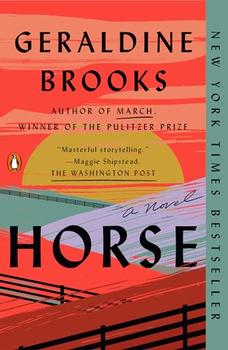Summary | Excerpt | Reading Guide | Reviews | Beyond the Book | Readalikes | Genres & Themes | Author Bio

A Novel
by Geraldine Brooks
Awful. It still read like a college paper, not a magazine article.
He flipped through the images on his desk. The artist confidently depicted what he knew-the crowded, vibrant world of nineteenth-century Black domestic life. He had to keep the text as simple and direct as the images.
Bill Traylor, born enslaved, has left us the only
A movement across the street drew his eye up from the screen. The neighbor was trying to move an overstuffed recliner. It was teetering on its side on the top step as she struggled to keep a grip on it.
She could use help. He did a quick personal inventory: Shorts on, check. T-shirt, check. Working in his un-air-conditioned apartment, Theo would sometimes spend the whole day in his underwear, forgetting all about his deshabillement until confronted by the quizzical gaze of the FedEx guy.
He reached the other side of the street just as gravity won, prising the chair from her grip. He jumped up the step and body-blocked it. Her only acknowledgment was a grunt and a quick lift of her chin. She bent down and grabbed the underside of the chair. Theo hefted an armrest. Together, crabwise, they shuffled to the curb.
The woman straightened, pushing back her thin, straw-colored hair, and rubbing her fists into the small of her back. She waved an arm at the ziggurat. "Anything you want …" Then she turned and ascended the steps.
Theo couldn't imagine wanting anything in this sadness-infused pile of discards. His apartment was sparsely furnished: a midcentury-modern desk and a Nelson sofa acquired at a thrift store. The rest of the available space was filled mostly with art books, shelved on scavenged planks and milk crates he'd spray-painted matte black.
But Theo, the son of two diplomats, had been raised by the commandment that bad manners were a mortal sin. He had to at least pretend to look. There were some old paperbacks stuffed into a beer carton. He was always curious about what people read. He reached down to check the titles.
And that was when he saw the horse.
JESS
Smithsonian Museum Support Center, Maryland
2019
Jess was seven when she dug up the dog. He'd been dead a year. She and her mum had buried him with ceremony, under the flowering red gum in the backyard, and they'd both cried.
Her mother wanted to cry again when Jess requested large Tupperware containers for the bones she'd just exhumed. Generally, Jess's mother was the kind of parent who would let her daughter set the house on fire if she thought it could teach something about carbon and oxygen. But she was stricken with a stab of anxiety: was digging up a beloved pet and macerating its corpse a sign that your child had psychopathic tendencies?
Jess tried her best to explain that she'd dug up Milo because she loved him, and that's why she had to see what his skeleton looked like. Beautiful, as she knew it would be: the swoop of the rib cage, the scoop of the eye sockets.
Jess loved the interior architecture of living things. Ribs, the protective embrace of them, how they hold delicate organisms in a lifelong hug. Eye sockets: no artisan had ever made a more elegant container for a precious thing. Milo's eyes had been the color of smoky quartz. When Jess touched a finger to the declivities on either side of his delicate skull, she could see those eyes again: the kind gaze of her earliest friend, avid for the next game.
She grew up on one of the dense streets of liver-brick bungalows that marched westward with Sydney's first growth spurt in the 1900s. Had she lived in a rural place, she might have exercised her fascination on road-killed kangaroos, wombats, or wallabies. But in inner Sydney, she was lucky to find a dead mouse, or perhaps a bird that flew into a plate-glass window. Her best specimen was a fruit bat that had been electrocuted. She found it on the nature strip under the power lines. She spent a week articulating it: the papery membrane of the wing, unfolding like the pleated bellows of an accordion. The metatarsal bones, like human fingers, but lighter-evolved not to hold and grasp, but to fan the air. When she was done, she suspended it from the light fixture in her bedroom ceiling. There, stripped clean of all that could readily decay, she watched it fly forever through endless nights.
Excerpted from Horse by Geraldine Brooks. Copyright © 2022 by Geraldine Brooks. All rights reserved. No part of this excerpt may be reproduced or reprinted without permission in writing from the publisher.
Your guide toexceptional books
BookBrowse seeks out and recommends the best in contemporary fiction and nonfiction—books that not only engage and entertain but also deepen our understanding of ourselves and the world around us.